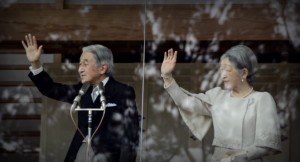
The Imperial Couple: Emperor Akihito and Empress Michiko greet crowds during the Emperor’s New Year Address. Photo by NightFall404 via Flickr.
Japan is now the last country in the world whose monarch still uses the title of ‘Emperor’. Claimed to be the world’s oldest continuous hereditary monarchy, the Imperial line can be traced back over a millennium.
Despite this supposedly unmatched period of sovereignty, the Japanese throne has not always been a seat of true power. Emperors have usually ‘reigned’ rather than ‘ruled’, with others, be it court regents, military shoguns, or government ministers, wielding actual authority whilst paying lip-service to the Emperor.
The 1889 Constitution of Japan declared the Emperor as divine; in Article three he was officially described as “sacred and inviolable”. Throughout the following decades, he became a rallying focus for Japanese nationalism and aggressive militaristic expansion into Korea and China. Japan’s defeat in WWII was followed by a backlash of anti-nationalist sentiment, with perpetuators of the Imperial ‘cult’ seen as instigators of the conflict and thus responsible for its repercussions.
Post-war Reform
It was unsurprising that the Emperor was a primary target for reform by the post-war American occupation, which took it upon itself to democratise and pacify Japan. The fact that Emperor Hirohito was allowed to remain at all, rather than being tried as a war criminal, remains a point of contention. The complex issues surrounding wartime responsibility made unclear the extent to which the Emperor had been taken advantage of by the military, and how far he had condoned its actions.
“The Americans probably wanted to keep the Emperor as a means of controlling the Japanese,” comments Yuuki Shigemoto, a graduate student from Aichi Prefecture. “If they killed him … he would have become even more of a symbol for the nationalist cause.”
Article one of the new Japanese Constitution of 1947, composed under Allied supervision, declares that the Emperor should be “the symbol of the State and of the unity of the people”, with whom sovereign power resides. The Emperor remained only as a figurehead, severed from political activity.
Since WWII, the Emperor’s image has been gradually humanised in the media. Sugimori and Hamada noted in a study that during the post-war era, newspapers’ use of special honorifics for the Emperor has steadily declined, being all but eliminated by 1993. This is part of a general trend transforming the Emperor from a revered, divine figure into a more down to earth monarch.
The current Imperial couple, Emperor Akihito and Empress Michiko, have broken with centuries of tradition in their request for a simple cremation after their deaths, “to minimize the impact on the lives of the citizens”.
Hope in a Crisis
The Emperor’s role today is as a symbol of national unity and hope. Following the earthquake, tsunami, and Fukushima Dai-ichi nuclear disaster of March 2011, his visit to the stricken areas was seen as an attempt to bring a troubled country back together. His New Year speech on January 2nd showed recognition of the human cost of the disaster, whilst calling upon the Japanese people to rebuild their lives. He even voiced his sympathy through the ancient tradition of Imperial poetry composition. One poem by Emperor Akihito, On Visiting the City of Soma after the Great East Japan Earthquake, was translated as follows:
As the tsunami gushed in
Out sailed the brave boats to sea
So glad am I
To see them moored to their posts
The boats that returned from sea
The Emperor’s compassion in times of crisis has engendered public support, even amongst the younger generation. Yu Katono, a Law student from Fukushima Prefecture commented, “Before the tsunami, I didn’t care that much about whether we had an Emperor or not, but when he came to Fukushima … it encouraged us very much. It was then that I realised that the Emperor is a good thing for the Japanese people.”
The Succession Debate
Perhaps the biggest problem facing the Imperial family today is the debate over Imperial succession and the shortage of legitimate heirs. Current law states that a female Imperial family member must officially leave the Imperial family upon marriage outside of the royal bloodline. In 2004, Emperor Akihito’s only daughter, Princess Nori, married a bureaucrat, forcing her to renounce her royal status.
Some Japanese political commentators voice concerns that current succession practices are unsustainable, as eligible heirs grow fewer with each generation. One suggestion is to allow princesses to keep their royal status after marriage to commoners, creating their own branches of the Imperial family. This has proven contentious among conservative Japanese, as it would break the ‘uninterrupted’ patrilineal succession of Emperors.
Nevertheless, the position of Emperor seems to be in little immediate danger. Whilst not receiving outspoken support from all citizens, there are relatively few who actively oppose his reign. Since the end of WWII, the Imperial office has become less politically charged in the eyes of the world, albeit that it is now Emperor Akihito, rather than the controversial Hirohito, who occupies the throne. The Imperial Household Agency ensures that his speeches avoid controversial topics, such as Okinawa and Japanese wartime atrocities. Such issues always hold the danger of opening up old wounds, which Japan has been reluctant to face head-on.
The Japanese Emperor has shown an ability to adapt to the evolving requirements of a 21st century monarch, whilst retaining his link with the ancient traditions that many Japanese still hold dear. It remains to be seen how the Imperial office will be forced to change in response to future demands. Perhaps, as is the case with the British monarchy, we may see alterations to the rules of succession to allow the son of a princess to ascend to the throne. Unlikely as it seems for now, might there even be a time when Japan sees the reign of an empress?



